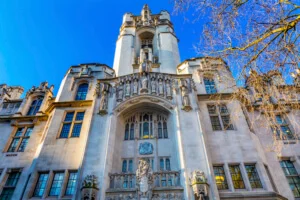Discretionary Trusts

Contact
Table of Contents
What is a discretionary trust?
With a discretionary trust, there is no automatic right for beneficiaries to receive funds from the trust. Instead, the trustees are given broad powers to decide how and when the money is distributed, making them one of the most flexible forms of trust available. These broad powers are known as discretionary powers, allowing trustees significant authority in managing the trust.
A discretionary trust enables trustees to allocate income and capital from the trust entirely at their discretion. They are responsible for deciding who should benefit from the trust, when and in what proportion. This means there’s much more flexibility and funds can be paid out or withheld as circumstances change. When making these decisions, trustees must communicate with other trustees to ensure the trust is administered properly.
How do discretionary trusts work?
A common way to set up a discretionary trust is in a will but you can also set one up during your lifetime. With this type of trust, money and assets are placed into the trust for the benefit of the trust’s beneficiaries. The trust must have at least one beneficiary to work. Beneficiaries can be named individuals or they can be groups of individuals, such as “my grandchildren” or other family members. They can also include people who are not born yet. For example, “my grandchildren” could include all the grandchildren that may be born in the future. The trust can also include beneficiaries beyond immediate family members.
What’s unique about discretionary trusts is that the beneficiaries are classified only as potential beneficiaries. They do not become actual beneficiaries until the trustees decide to pass funds to them. The trustees can decide which of the beneficiaries receive a distribution, how much they receive and when they receive it. It’s important that trustees are people you trust, as you essentially hand all decisions over to them.
Setting up a discretionary trust
The first step in setting up a discretionary trust is to draft a trust deed, setting out the terms of the trust, the settlor’s wishes, the chosen beneficiaries, and the appointed trustees. The trust deed guides the trustees in managing the trust income and assets according to the settlor’s intentions.
Once the trust deed is in place, the settlor must transfer assets – such as property, money, or investments – into the trust. It’s important to note that trust income is taxed differently from personal income, and the trustees are responsible for ensuring that the correct amount of tax is paid.
Protecting assets with discretionary trusts
Discretionary trusts are an effective way to protect family assets. When you place assets into a discretionary trust, they are no longer part of your personal estate. They can be used to shield assets from risks such as creditors, divorce settlements, or poor financial decisions by future generations.
The key feature of a discretionary trust is that the trustees decide how and when to distribute the assets. This gives them the flexibility to respond to changing circumstances and support beneficiaries in the most appropriate way. It also helps prevent assets from being wasted or accessed by those not intended to benefit from them.
What are the benefits of discretionary trusts?
Discretionary trusts can sound strange on the face of it but there are many reasons why they may be an important part of your estate planning.
- For one, discretionary trusts can be used to manage wealth across multiple generations. You can name grandchildren and their descendants as beneficiaries, for example, even though most of those people are not born yet.
- Second, a discretionary trust can protect a vulnerable person, such as an adult child with learning difficulties who may not be able to manage money on their own.
- Third, a discretionary trust can ensure that a beneficiary in receipt of means-tested benefits receives funds in smaller amounts over time. That way, they do not lose these benefits as they would if they inherited a lump sum of money.
- Finally, a discretionary trust is extremely useful if you would rather take a “wait and see” approach than fix the inheritance at the time of your death. By leaving things in the hands of trustees, you can make sure that money is distributed according to who needs it more. For example, the trustees could release money if a beneficiary wishes to buy a property. Or they could withhold funds until a beneficiary with a gambling habit has addressed their addiction. The trustees can decide what is best for the beneficiaries in each case.
What are the disadvantages of discretionary trusts?
- Discretionary trusts can be complex, requiring trustees to understand trust and tax laws. Professional trustees may be needed, which can incur additional costs.
- Not all potential beneficiaries are guaranteed to benefit, as trustees have discretion over who receives benefits and how much. This may lead to some intended beneficiaries missing out.
- A high level of trust is placed in the appointed trustees to ensure that their decisions align with the settlor’s intentions. The trustee’s role is to safeguard these intentions and manage the trust assets responsibly.
- While trusts may reduce the settlor’s tax bill, they can impose additional tax burdens on both trustees and beneficiaries.
What is a letter of wishes for discretionary trusts?
Since the trustees have a lot of power, you may want to give some guidelines for them to follow. This can be achieved by leaving a letter of wishes along with your will, setting out the settlor’s wishes regarding the circumstances in which you would like your beneficiaries to receive their assets.
The trustees are not bound by a letter of wishes, but they can take it into account when managing the estate and it can guide them when deciding how to distribute assets.
Managing a discretionary trust
The ongoing management of a discretionary trust fund is a significant responsibility for trustees. Trustees must act in accordance with the trust deed and the settlor’s wishes, using their discretion to invest trust assets wisely, accumulate income, and distribute proceeds to beneficiaries as appropriate.
Effective trust fund management involves keeping detailed records of all financial transactions, ensuring compliance with tax obligations, and providing regular updates to beneficiaries about the trust’s performance.
Trustees may also need to seek advice from investment managers, accountants, or legal professionals to ensure the trust fund is managed in the best interests of all beneficiaries. By carefully managing the trust assets and income, trustees help preserve the value of the fund and support the long-term goals of the trust.
Taxation of discretionary trusts
When a discretionary trust is created, the transfer of assets into the trust is subject to an immediate assessment to Inheritance Tax (IHT). If the value of the assets exceeds the IHT nil rate band (currently £325,000), there will be an immediate tax charge, although it may be possible to claim reliefs.
Discretionary trusts are also subject to a periodic charge to Inheritance Tax every 10 years at 6% of the trust’s value over the nil rate band. A discretionary trust will also pay income tax at the highest rate. Currently, any gross income above £1,000 at 45% or 39.35% for dividends. The trustees will need to make annual income tax returns every year.
Discretionary trusts and inheritance tax
Discretionary trusts give you flexibility in estate planning so you can distribute assets as and when you want. But they come with inheritance tax implications. When assets over the current IHT nil rate band of £325,000 are put into a discretionary trust they are taxed immediately.
If the settlor dies within seven years of making a transfer into the trust, there may be additional IHT charges, and taper relief could apply. The value of the settlor’s estate, along with any chargeable gifts made by the settlor, will impact the overall IHT calculation. Executors must deal with trusts as part of estate administration, ensuring all tax and legal obligations are met. For IHT purposes, both the income and assets of the trust may be included in the estate.
Then every 10 years the trust is taxed at 6% on assets above the nil rate band. Discretionary trusts give control and protection to beneficiaries especially vulnerable ones.
Is a discretionary trust right for me?
Discretionary trusts can be beneficial for both beneficiaries and asset protection, but it’s important to weigh up the tax implications and the more extensive trust administration responsibilities. The key issue is to seek expert advice and make sure that a discretionary trust is the best vehicle for supporting your loved ones as part of your long-term tax and estate planning.
How we can help
Set up a discretionary trust today to protect your assets and ensure your loved ones are cared for according to your wishes. Contact us now to get started. Call 020 7485 8811 or fill in the contact form below.
Share this article
Speak to us about setting up a Discretionary Trust
Call us 020 7485 8811
Email us Send us an email and we’ll get back to you
Emily Lund was very patient with our ignorance about the conveyancing process. She was consistently professional, cheerful and prompt. Thank you!
“Many thanks for your patience and clear explanations”
Will Ford is a highly respected practitioner who has an encyclopaedic knowledge of housing law. He is extremely intelligent and very hard-working.
Your service was professional as one would expect and clear along the way
"A capable contested probate team that seems to care. Katie de Swarte is an up and coming star."
Related InsightsVIEW ALL
- 7.7.2025
Daughter Wins Care Payment Claim Against Mother’s...
Daughter’s claim for payment for late mother’s care succeeds A judge has allowed a woman’s contractual claim...
Read more - 4.6.2025
Supreme Court Confirms ‘No-Profit’ Rule For Fiduciaries
Trustees: Supreme Court confirms ‘no change’ to ‘no-profit’ rule for fiduciaries The contested probate and trusts team at Osbornes Law...
Read more - 15.5.2025
Family Conflicts Over Contested Wills
Inheritance disputes: when loved ones become opponents over an unclear will The contested wills and probate team at Osbornes Law...
Read more - 9.12.2024
Executors’ and Administrators’ Duties
Introduction When someone dies, others need to take on the formal responsibility for dealing with the deceased’s estate. If...
Read more - 9.12.2024
What To Do When Someone Dies
When a loved one dies, getting to grips with what you need to do can seem bewildering. The first question...
Read more - 6.11.2024
High Court Validates Donation in Will Dispute
High Court validates gift made during Covid lockdown in Will Dispute In what may be one of the first covid...
Read more - 5.11.2024
Dementia: Protecting The Interests Of Each Spouse
Protecting Loved Ones with Dementia Dementia is a cruel disease, slowly robbing individuals of their character and their abilities. The...
Read more - 12.7.2024
Probate Mediation
Why choose mediation for contested probate? At Osbornes, we understand that probate litigation is often highly emotive. Unfortunately, there is...
Read more - 12.7.2024
Is A Handwritten Will Legal?
Is a handwritten will legal? Is a question we often hear, especially when time is of the essence, and putting...
Read more - 25.4.2024
A Guide to Will Trusts
What is a trust in a will ? Setting up a trust in your will can protect assets for your loved...
Read more - 25.4.2024
A Guide to Asset Protection Trusts
One good reason to place your assets into a trust is to protect family wealth without fearing for its future....
Read more - 25.4.2024
What is a Mirror Will?
Mirror wills are mirror images of each other and practically the same in every way. They suit couples, married or...
Read more - 23.4.2024
A Guide to Life Interest Trusts
In today’s complex families, protecting assets for your children while ensuring that a surviving spouse can still enjoy them...
Read more - 23.4.2024
Disputes Between Executors and Beneficiaries
What are your rights? When a loved one dies, their beneficiaries understandably want to settle their affairs and receive their...
Read more - 23.4.2024
What Rights Does a Beneficiary of a Will...
As a beneficiary of a will, it’s a mistake to sit idly by and wait for your inheritance. A...
Read more - 22.4.2024
5 Things You Should Never Put in a Will
When it comes to writing a will, you want to make sure that your wishes are known and that the...
Read more - 22.3.2024
Forged Wills
Will fraud and forged wills are increasingly common. If the contents of a will comes as a surprise, then one...
Read more - 14.2.2024
What is Proprietary Estoppel?
What is Estoppel? In general terms, estoppels operate where one party has acted on the basis of a statement made...
Read more - 14.2.2024
Duties of Trustees
When setting up or running a trust it’s important to know what the trustees duties are. Trustees are key...
Read more - 3.11.2023
Deed of Variation: Making a Change to an...
What is a deed of variation? A deed of variation is a legal document which can be used to alter...
Read more - 31.10.2023
Constructive Trusts
Property rights are not always clear-cut. Sometimes, a person who does not legally own a property could be entitled to...
Read more - 17.9.2023
What is a Codicil to a Will?
Codicil to a will Life has a habit of changing and your will may need to change with it. A...
Read more - 31.8.2023
What Happens if Someone has Dementia and No...
Can you get Power of Attorney for someone with dementia? It’s a sad reality in an ageing population that...
Read more - 31.8.2023
Can a Lasting Power of Attorney Be Overridden?
Dramatic rise in people making a Power of Attorney The number of people recognising the importance of making a Lasting...
Read more

























